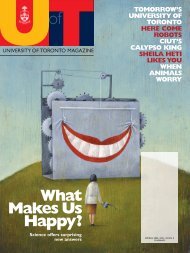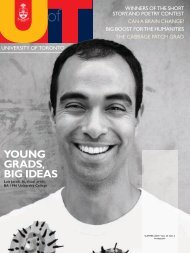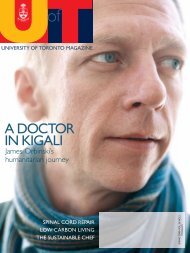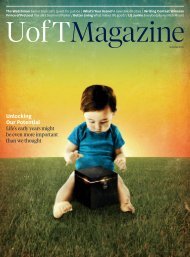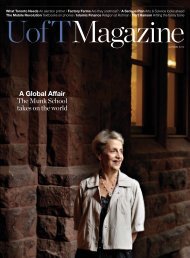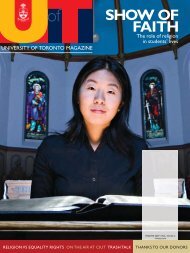The Next Big Idea 10 concepts that could - University of Toronto ...
The Next Big Idea 10 concepts that could - University of Toronto ...
The Next Big Idea 10 concepts that could - University of Toronto ...
Create successful ePaper yourself
Turn your PDF publications into a flip-book with our unique Google optimized e-Paper software.
Education for All Why do some immigrant<br />
groups fare better than others in school<br />
Canada has an <strong>of</strong>ficial policy <strong>of</strong> multiculturalism, but the<br />
country’s largest school board might not be meeting the needs<br />
<strong>of</strong> children <strong>of</strong> newcomers – at least in the case <strong>of</strong> one significant<br />
ethnic group. <strong>The</strong> dropout rate for first-generation Latin<br />
American students and Spanish-speaking youth is 37 per cent,<br />
almost double the <strong>Toronto</strong> average.<br />
That’s cause for concern. Why do children <strong>of</strong> some immigrant<br />
groups fare better than others in the <strong>Toronto</strong> school<br />
system And how can the system be improved to meet the<br />
needs <strong>of</strong> newcomers from all parts <strong>of</strong> the world<br />
Conventional wisdom says cultures <strong>that</strong> place a low value<br />
on education are at least partly to blame for high dropout rates<br />
among some student groups. But in interviews with Latin<br />
American students, Pr<strong>of</strong>essor Ruben Gaztambide-Fernandez<br />
<strong>of</strong> the Centre for Urban Schooling at OISE found precisely<br />
the opposite to be true: Spanish-speaking students are highly<br />
aware <strong>that</strong> getting a good education and mastering the English<br />
language are crucial for their future. “<strong>The</strong> situation <strong>that</strong> leads<br />
them to leave school really has nothing to do with how committed<br />
they are to school,” he says.<br />
What administrators should be asking is what conditions<br />
are making it difficult for some groups, such as Latin American<br />
students, to stay in school. Gaztambide-Fernandez points<br />
to three significant issues. First, cutbacks in the 1990s left<br />
school boards with less money for ESL instruction. Students<br />
are now slotted into one <strong>of</strong> three ESL levels, meaning <strong>that</strong><br />
many are placed in a class inappropriate to their skills. In<br />
some worst-case scenarios, advanced students are placed in<br />
beginner classes because the school doesn’t have the resources<br />
to <strong>of</strong>fer more than one level <strong>of</strong> instruction.<br />
Second, Latin American students report feeling subject to<br />
prejudice from teachers and their peers, and believe <strong>that</strong> the<br />
curriculum “ignores” their culture and history. Better teacher<br />
education can help, says Gaztambide-Fernandez, but so can<br />
asking students to share stories about their own history and<br />
culture with their class. This tells students <strong>that</strong> their culture<br />
is valued, and gives them responsibility for shaping their<br />
peers’ views, he says.<br />
Finally, many immigrant students work in the evenings to<br />
help support their family. <strong>The</strong>y have no choice but to sacrifice<br />
academic achievement for economic security. As well, some<br />
students might choose an academic path <strong>that</strong> is less appealing<br />
to them if it holds out the promise <strong>of</strong> being able to obtain<br />
a job sooner. <strong>The</strong> question for schools, says Gaztambide-<br />
Fernandez, is how to support students so their choices aren’t<br />
dictated solely by their social and economic circumstances.<br />
Ultimately, ensuring <strong>that</strong> the education system is meeting<br />
the needs <strong>of</strong> new Canadians will ensure a brighter economic<br />
future for everyone. “If we want multiculturalism to be a<br />
strength <strong>of</strong> Canadian society, then we have to learn how to<br />
take advantage <strong>of</strong> the differences immigrants bring,” he says.<br />
– Scott Anderson<br />
32 WWW.MAGAZINE.UTORONTO.CA



